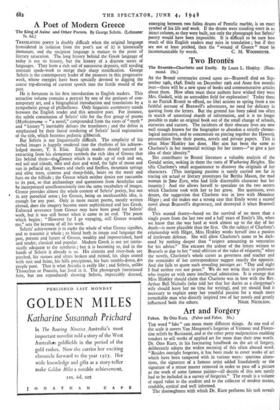A Poet of Modern Greece
The King of Asine and Other Poems. By George Seferis. (Lehmann 7s. 6d.)
TRANSLATING poetry is doubly difficult when the original language (considered in isolation from the poet's use of it) is historically immature, and the recipient language is mature to the point of literary saturation. The long history behind the Greek language of today is not its history, but the history of a discrete series of languages. They form a rich soil of successive deposits, still needing constant spade-work to merge their sharp stratification. George Seferis is the contemporary leader of the pioneers in this progressive work, whose energies have been specially devoted to digging the coarse top-dressing of current speech into the fertile mould of the past.
He is fortunate in his first introduction to English readers. This attractive volume contains a portrait by one of the geniuses of con- temporary art, and a biographical introduction and translations by a sympathetic group of philhellenes. Only linguistic asymmetry stands between the English reader and this sensitive poet. For instance, the subtle connotation of Seferis' title for the first group of poems (Mythistorema = "a novel," compounded from the roots of " myth " and "history ") inevitably defeats the translators ; and the defeat is emphasised by their literal rendering of Seferis' lucid explanation of the title, which becomes pedantic gibberish.
But Seferis is not linguistically difficult. The simplicity of his verbal images is happily rendered into the rhythms of his acknow- ledged master, T. S. Eliot. English readers should succeed in extracting from his elementary symbols the rich idea of Greece that lies behind them—thesGreece which is made up of rock and sea, red soil and islands, mist and dust and wind, the light of moon and sun in pellucid air, flowers and shells and fireflies, mountain springs and olive trees, cisterns and sheep-folds, boats on the water and huts on the hillside ; the Greece which neither denies nor succumbs to its past, so that archaeology and quotations from Aeschylus can be incorporated unselfconsciously into the same vocabulary of images. Greece provides almost the whole content of Seferis' poetry, but not
• in any parochial sense ; for Greece, being an inexhaustible idea, is enough for any poet. Only in more recent poems, mostly written abroad, does the imagery become more sophisticated and less Greek. Enforced severance from Greece may have been good for Seferis' work, but it was still better when it came to an end. The poem which begins: "However far I go voyaging, still Greece wounds me," sets the keynote of all his work. Seferis' achievement is to evoke the whole of what Greece signifies, and to transmit it whole ; to blend both in image and language the past, present and future of Greece, wealthy and impoverished, hard and tender, classical and popular. Modern Greek is not yet intrin- sically adequate to the synthesis ; but it is becoming so, and in the hands of Seferis it already is so. His cisterns and river-beds are parched, his statues and altars broken and ruined, his ships coated with rust and brine, his hills precipitous, his huts tumble-down, his people poor. That is what Arcadia is really like ; and Seferis, unlike Theocritus or Poussin, has lived in it. The photograph (mentioned here, but not reproduced) showing Seferis, impeccably dressed,
emerging between two fallen drums of Pentelic marble, is an exact symbol of his life and work. If the drums were standing erect in an intact column, as they were built, not only the photograph but Seferis' poetry would have been impossible. It is difficult to be sure how much of this English readers may miss in translation ; but if they are not at least pricked, then the "wound of Greece" must be


































 Previous page
Previous page